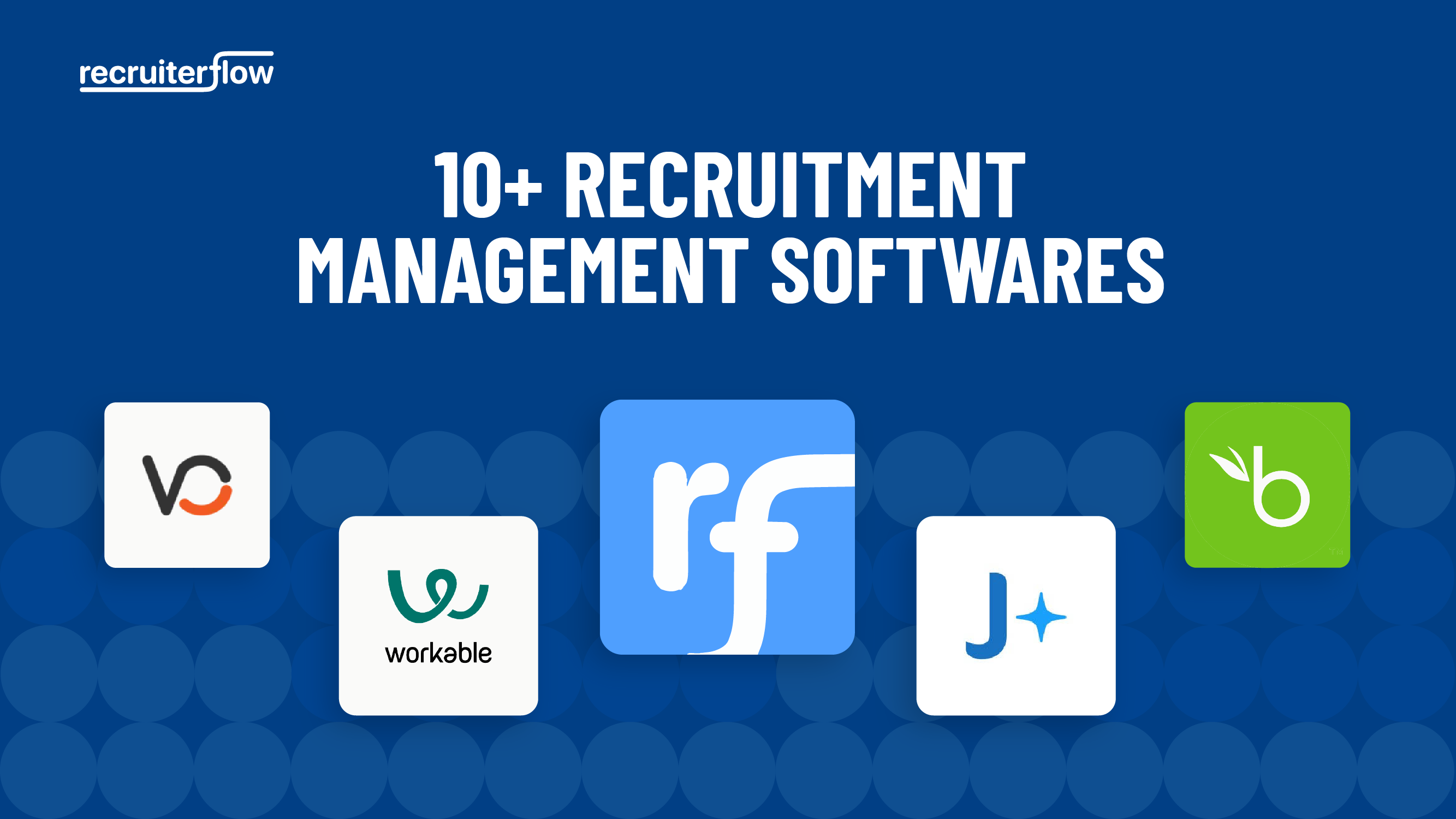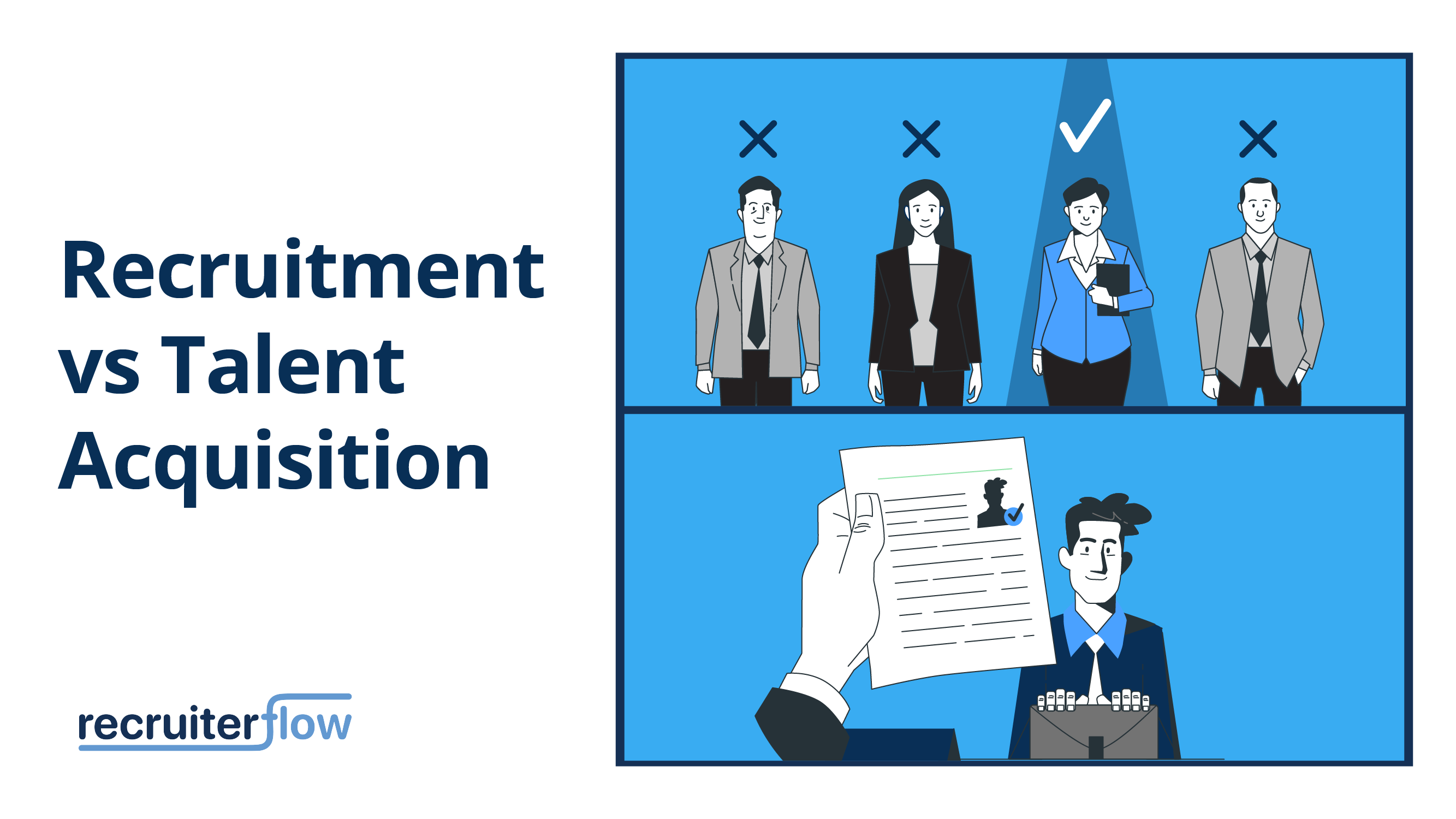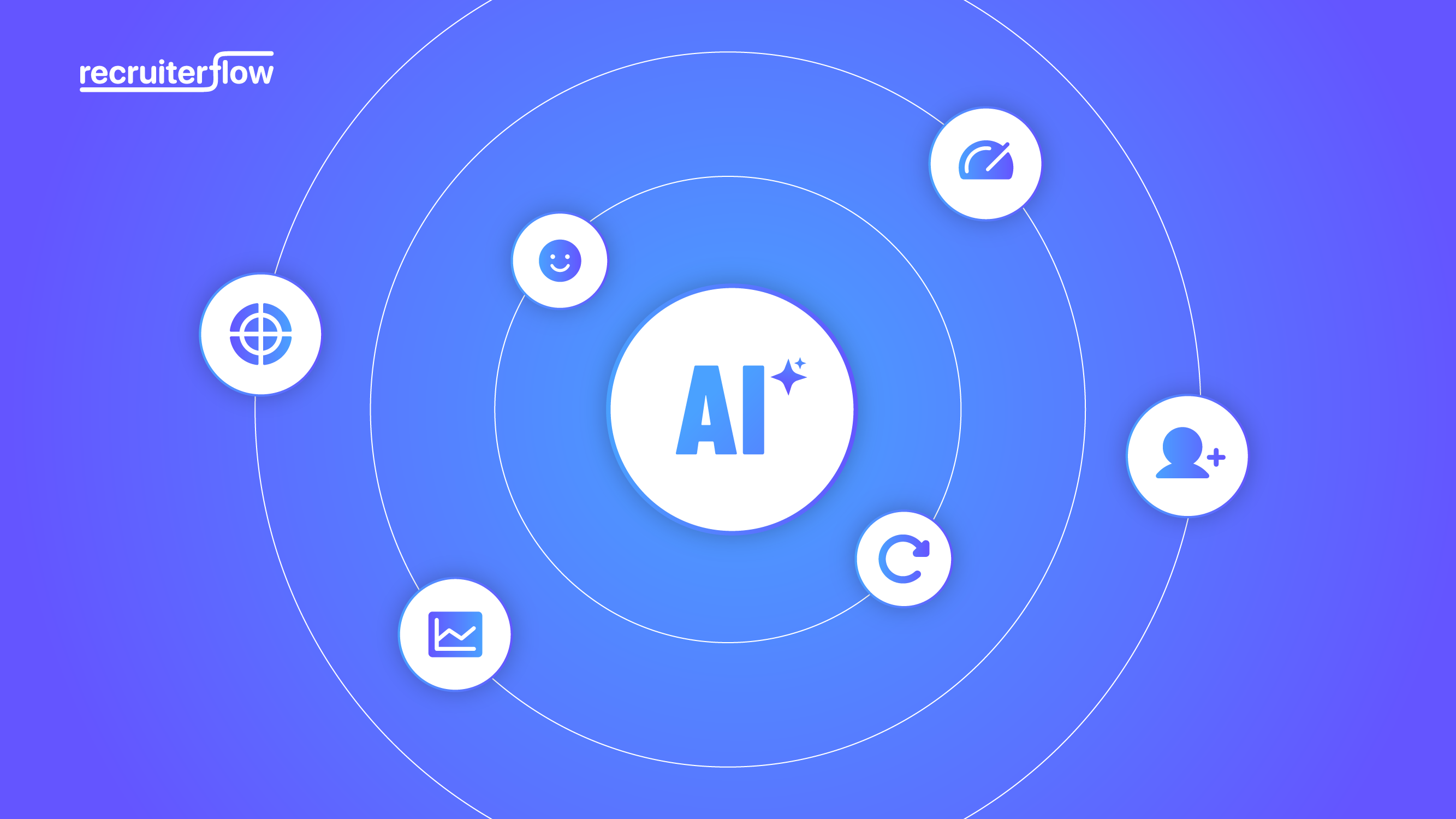
Recruitment vs Talent Acquisition: Differences

Are the two words recruitment and talent acquisition synonyms or is it recruitment vs talent acquisition? Let’s find out.
In the talent landscape, two terms frequently echo through hiring halls: recruitment and talent acquisition. These two terms, often used interchangeably, have subtle differences that impact your organizational success. While the goal – finding amazing people – may seem identical, the strategies employed are entirely different.
What is Recruitment?
Recruitment is the process of actively pursuing, discovering, and hiring potential candidates for a designated position or role.
It is basically a task-oriented process focused on providing an immediate solution by quickly and efficiently filling a wide variety of job openings.
What is Talent Acquisition?
Contrary to recruitment’s reactive approach to hiring, talent acquisition is a proactive process. It goes beyond the immediate need to fill job openings; instead, talent acquisition anticipates and strategically plans for the forthcoming workforce requirements of a company.
Talent acquisition is akin to a forward-thinking chess game, where each move is calculated with the future in mind. It involves forecasting the skills, expertise, and positions that will be vital for the organization’s sustained success. This proactive stance enables companies to align their talent pool with long-term strategic objectives.
Recruitment vs talent acquisition: How are they different?
Let’s look at the ways these two concepts differentiate from each other with respect to the tasks performed.
| Tasks | Recruitment | Talent Acquisition |
| Focus | Immediate job requirements | Building a long-term talent pipeline |
| Approach | Reactive | Proactive |
| Time Frame | Immediate and task-oriented, focused on prompt role filling | Building relationships, creating employer brand, addressing long-term needs. |
| Nature of Tasks | Quickly filling roles, less emphasis on other aspects | In-depth understanding of skills, company fit, and long-term goals. |
| Initiation | Triggered by open positions or anticipation. | Initiated with analysis of needs, objectives, and skills before search. |
| Approach towards Candidates | Focused on current needs, less emphasis on long-term relationships | Emphasis on building strong candidate relationships, understanding goals. |
| Employer Branding | Handle job market changes, expand, bridge skill gaps, create hiring strategies | Integral strategy for building strong employer brand, long-term visibility. |
| Goals | Promptly fill open positions | Handle job market changes, expand, bridge skill gaps, create hiring strategy. |
Also, read our blog on sourcing vs recruitment
Difference between a talent Acquisition specialist and recruiter
Talent Acquisition Specialist
Talent acquisition Specialists have a multifaceted role that surpasses merely filling job openings.
Their primary focus lies in building a compelling employer brand and crafting a positive candidate experience.
Also read: How to Create an Employer Brand that Candidates Love
This involves analyzing current and future staffing needs, devising and executing employer branding and recruitment marketing strategies, and developing comprehensive talent acquisition plans.
TA specialists manage employee referral programs and meticulously study the talent acquisition process to identify and resolve any bottlenecks. Evaluating candidate satisfaction and continually enhancing the candidate experience are vital aspects of their responsibilities.
Additionally, employing diverse sourcing methods for challenging roles and assessing talent acquisition performance to meet key staffing KPIs falls within the purview.
Recruiter
Recruiters are responsible for fulfilling specific hiring objectives aligned with the organization’s broader goals.
They collaborate closely with hiring managers to understand the nuanced requirements of open positions, encompassing responsibilities, key performance indicators (KPIs), and requisite skills. Utilizing various recruitment techniques—ranging from social media and job boards to attending networking events and career fairs—is a critical aspect of their role.
Managing the entire recruitment cycle, recruiters conduct background checks, coordinate interviews, and prepare and facilitate job offers.
Furthermore, they oversee the onboarding process for new hires, evaluate the recruitment pipeline to address any inefficiencies, and ensure that recruitment KPIs are met.
Also read: A complete guide to Recruitment Automation [With free automation checklist]
Skills to look for when hiring a TA specialist
Talent Acquisition Professionals need diverse skills to navigate the changing recruitment landscape. From communication prowess to technological adaptability, here are the essential skills a TA specialist should have –
Communication Skills
Mastery in both written and verbal communication is crucial for drafting engaging job posts, managing social media engagement, and facilitating effective correspondence with candidates and hiring managers.
Active Listening Skills
The ability to actively listen goes beyond verbal communication, involving the interpretation of diverse online presences of candidates and creating a holistic candidate persona.
Planning Skills
Proficiency in strategic planning is essential to visualize larger organizational goals while focusing on immediate staffing needs and maintaining an active talent pipeline.
Learning Skills
A proactive approach to learning and adapting to new situations encourages innovation and the evolution of talent acquisition practices in a constantly changing environment.
Relationship-building Skills
Prioritizing candidate experience and sustaining engagement with candidates, managers, and vendors is crucial while leveraging networking for success.
Empathy and Social Skills
Developing emotional intelligence and social prowess is essential to establish deeper connections with candidates.
Analytical Skills
Proficiency in data analysis is necessary to make informed decisions, drive recruitment strategies, and optimize talent acquisition processes.
Tech Skills
Adaptability to new technologies and platforms in recruitment involves collaborating with advancements for efficient sourcing and engagement. This can range from utilizing AI noise reduction apps to other innovative tools, ensuring a more efficient and effective process.
Social Media Skills
Mastery in engaging candidates through various social platforms, promoting the employer brand, and assessing candidates’ social media personas.
Multitasking Skills
Ability to manage multiple tasks simultaneously, adapt to changing workforce demands, and efficiently oversee full-cycle recruitment processes.
Also, read our blog on recruiting skills
Interview questions to hire a TA specialist
Planning to hire a TA specialist for your agency, here are a few interview questions you can shoot –
- Describe your approach to sourcing and attracting top talent across diverse industries and skill sets.
- How do you identify and engage with passive candidates in a competitive market?
- What strategies do you use to leverage social media and professional networks for effective talent acquisition?
- How do you ensure a positive and engaging candidate experience throughout the entire recruitment process?
- Describe a time you had to manage a challenging situation with a candidate or hiring manager. How did you resolve it?
- How do you utilize data and analytics to track and optimize your recruitment performance?
- Explain how you stay up-to-date on industry trends.
- Can you provide an example of how you’ve contributed to diversity and inclusion initiatives in your past recruitment efforts?
- Describe a unique or unconventional method you’ve used to source candidates successfully.
- How do you collaborate with different departments and teams to understand their hiring needs and preferences?
- What strategies do you implement to ensure high retention rates among the candidates you place?
- Can you discuss an instance where you faced an ethical dilemma in recruiting and how you addressed it?
- What recruitment technologies or tools are you most proficient in, and how do they enhance your recruitment process?
- How do you utilize behavioral interviewing techniques to assess a candidate’s potential for success in a role?
- How do you handle feedback from candidates or hiring managers? How do you use it to improve your recruitment process?
- Describe a unique recruiting project you spearheaded and the outcome. What did you learn from the experience?




Sagrika Jain